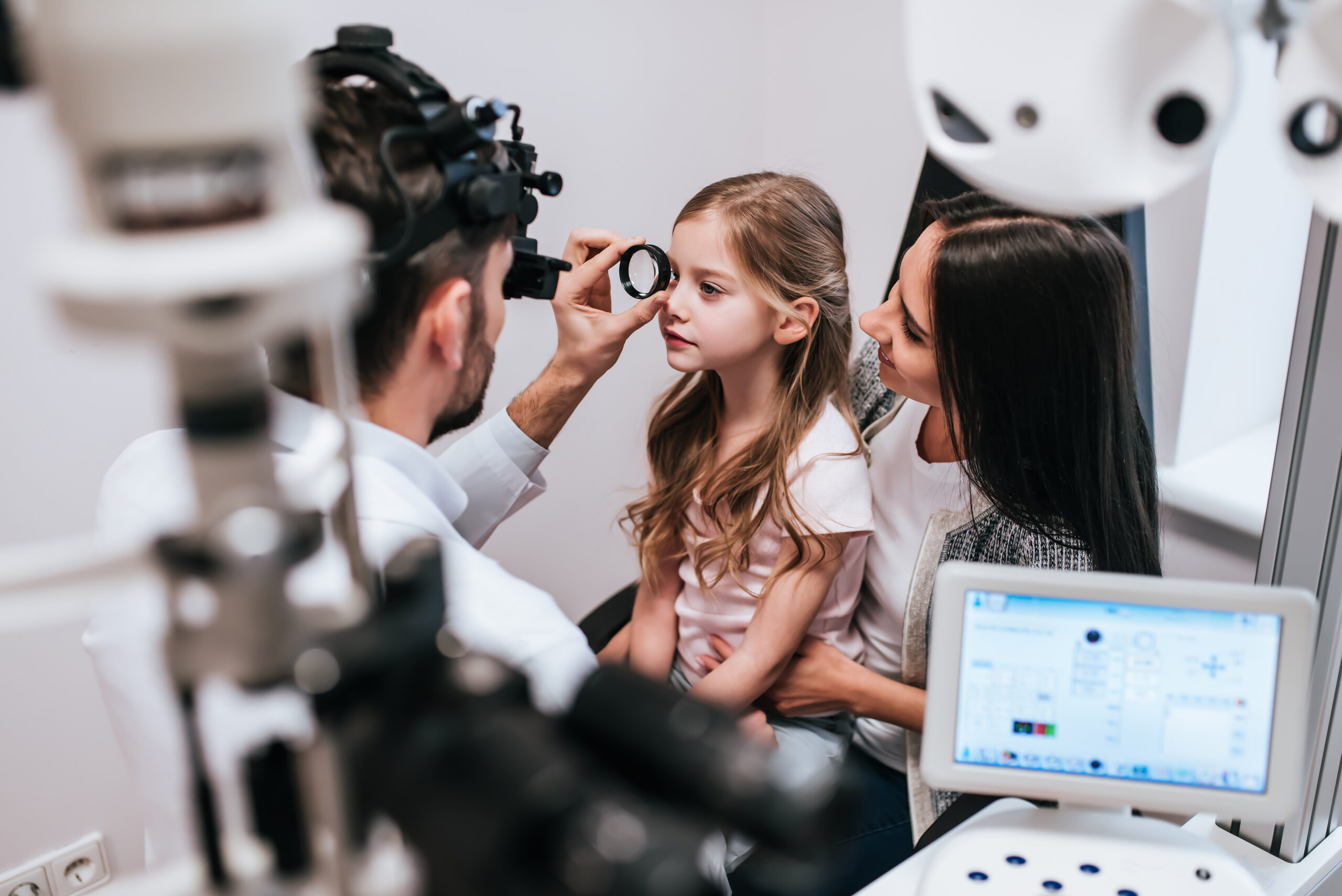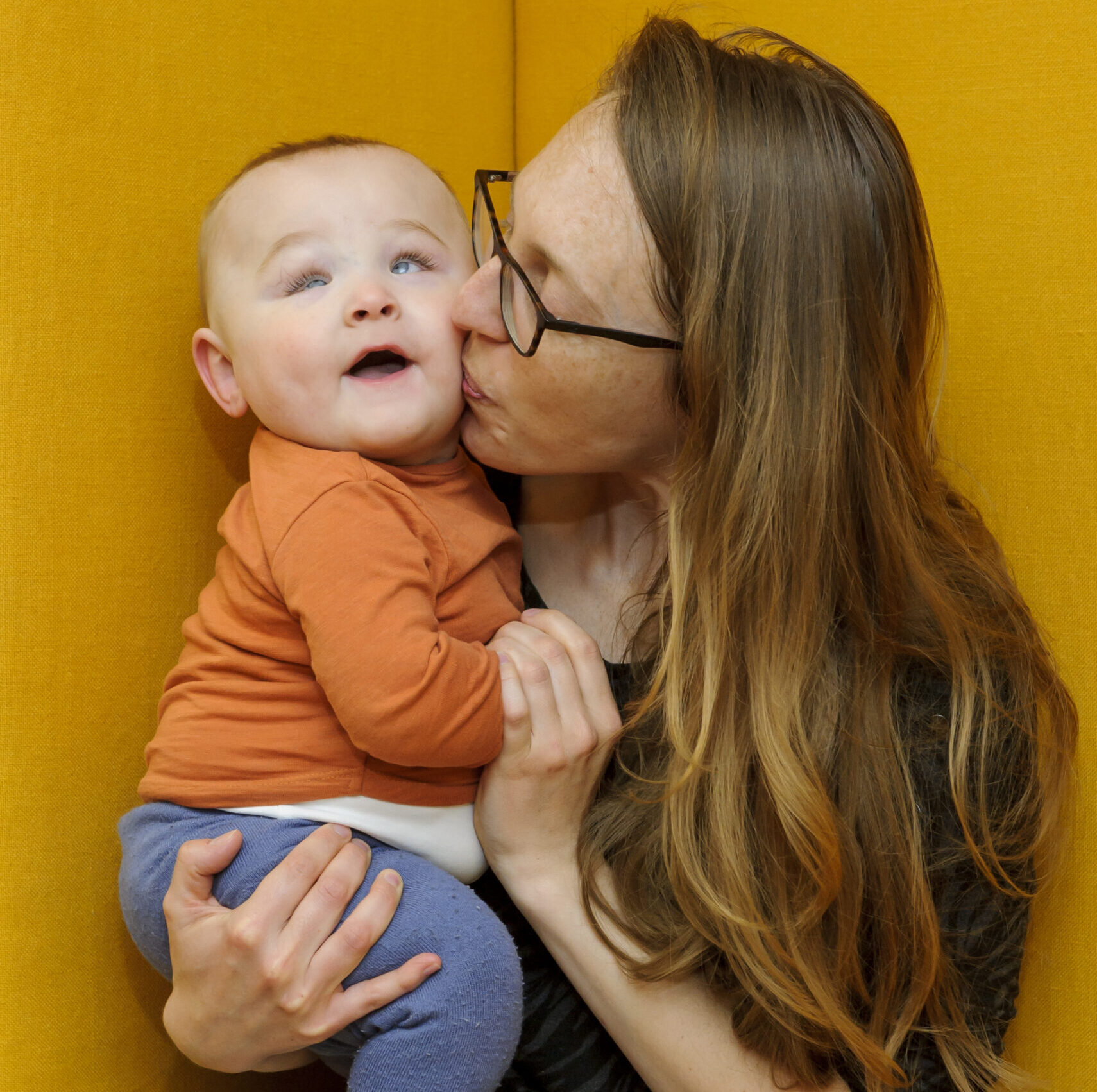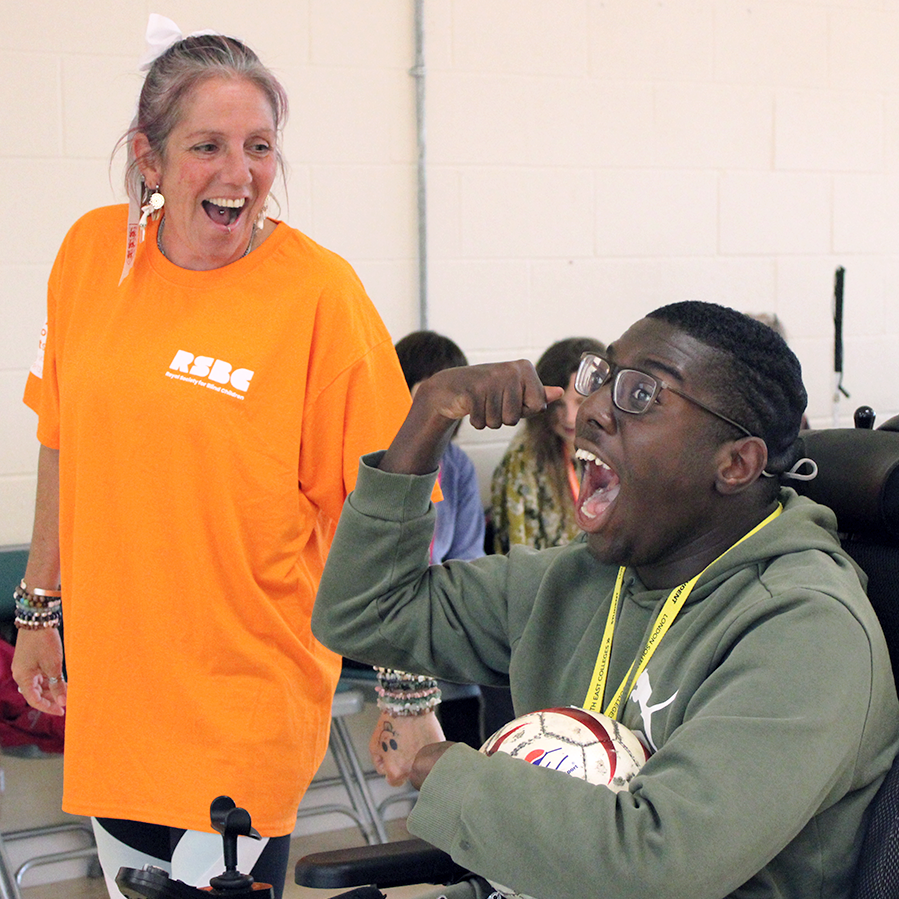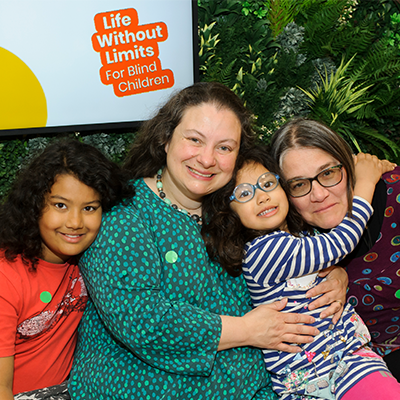Turn it up DJ
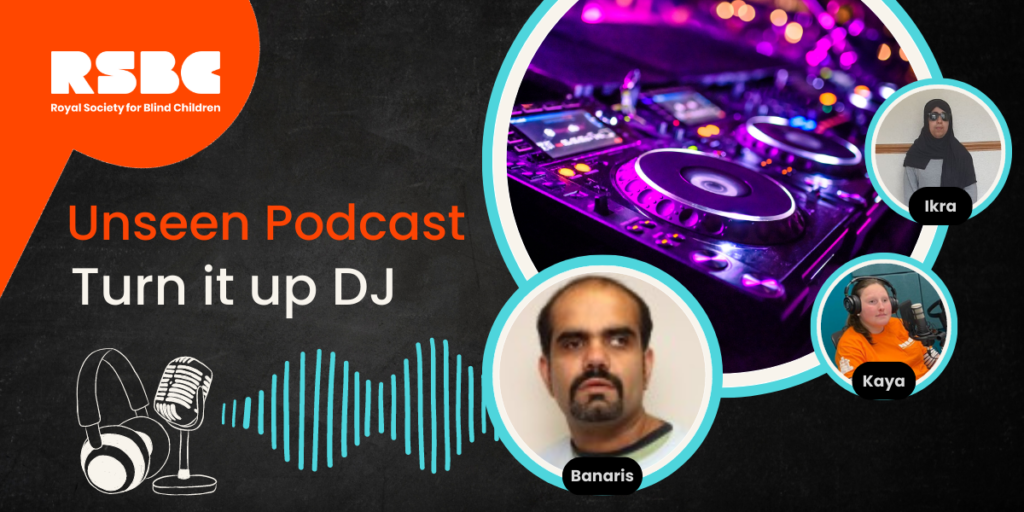
In this week’s captivating episode of the RSBC Unseen podcast, hosts Ikra and Kaya embark on an eye-opening journey as they delve into the world of radio broadcasting with a remarkable guest, Banaris Iqbal. With a distinguished career spanning over 25 years, Banaris is not only an experienced radio DJ but also a valued member of the management committee at Bradford Community Broadcasting Radio.
Tune in as Ikra and Kaya engage in an enlightening conversation with Banaris, who will share invaluable tips and insights on the challenges and triumphs of being a vision impaired broadcaster.
Don’t forget to let us know your thoughts by getting in touch at youth.forum@rsbc.org.uk.
Listen to the episode
Transcript
Banaris Iqbal
0:05
You’re listening to RSBC Unseen Podcast
Kaya
0:14
Hello, my name is Kaya. And today we will be talking about music and DJing. I’m here with Ikra. Hi. And we also have a very special guest with us today Banaris
Banaris Iqbal
0:27
Hi, Kaya and Ikra. Thank you for inviting me onto your wonderful podcast. I’m Banaris Iqbal, and I’m a long term volunteer and part of the Management Committee at BCB radio, we’re a local community radio station in Bradford. And I’m also a DJ, so I do a bit of everything.
Kaya
0:42
Fantastic. So how did you first get involved in DJing?
Banaris Iqbal
0:47
Well, actually, I always wanted to be a radio presenter. And when I left school, just before I left, I was asked to write at least 10 things on a list so I just put radio and just left it at that…
Read MoreLuckily BCB, which is Bradford community broadcasting were offering training courses advertising in our local people that were looking for volunteers to join our team, to learn about radio production, radio training and presenting skills. So it was a three month course three days a week, and I went down to chat to Mary Dowson, who’s our director. And Jonathan Pinfield was a broadcast manager at BCB.
Basically was asked if I wanted to go see a studio, see the studios, we just went down to look at the studio and I met a guy called John Wiles, who was doing the two til four slot, he said, you want to come on for 10 minutes, instead of it being 10 minutes, it lasted about two hours, because you had a two hour show so I joined him was a guest presenter.
I waited for about maybe two or three months, when I was accepted onto the course. And then it all just took off from there, I learned how to edit, present, interview, learned about the Ofcom now radio radio authority at the time guidelines and all the rules and regulations and then did some broadcasting with BCB.
And then after that, I actually I used to do the Ramadan radio in Keightley, which is for the month of Ramadan. And then anybody that heard my show, they literally rang me up and said this radio station is finished on this date, because it was short term licence. And can you come and join on ours and it just went on and on.
BCB radio is at the heart because they’re the people that gave me all the skills and the encouragement and me being visually impaired. They were very supportive and helpful for me to succeed and get to where I am today.
Kaya
2:21
That’s fantastic. And what’s your favourite genre of music?
Banaris Iqbal
2:26
Probably Punjabi, which is the Pakistani Punjabi music and also a Bhangra and Bollywood. Thank you.
Ikra
2:34
Hi. Hi. What are the advantages, and at the disadvantages of being a DJ as a visually impaired person.
Banaris Iqbal
2:44
I’ll start with the positives, the advantages, rather, it’s given me a lot of sort of success in the way of as a visually impaired person, I was very shy to ask for help and support or if I was lost, or something, I was very sort of held, held myself back from people, but the radios gave me the confidence that I will speak to anybody and everybody.
And so I will help helped me genuinely improve self-confidence skills, travel skills for my everyday day to day living, there’s I don’t think there’s any disadvantages really, because it just means it just gives me the confidence to sort of think that if I can do it, so can anybody else and it gives other people the encouragement to do similar sort of things or other stuff that they may think that not they might not be able to do.
And I would say that you might struggle, you might find it a bit hard in the beginning, but you will get there in the end, you’ve just got to learn never to give up and just carry on as best you can.
Ikra
3:35
Thankyou. And what tips and tricks would you give someone who wants to be a DJ as visually impaired person.
Banaris Iqbal
3:44
I just want to say that the tips if there’s any software or if there’s anything, what you’re finding hard to do speak to the radio station or whatever career you want to follow. Instead of holding yourself back and thinking, Oh, they might not be able to help me all they can say most likely with technology these days, they probably, you know, say yes. And they might find a way of helping you. So don’t hold yourself back. If there’s any software or anything that you find difficult to do, or to manage. Just be honest, and say, Look, this is a bit difficult. How can we work together? Improve on this? Or how can you help me improve it?
Yeah, just don’t hold yourself back. Just encourage others as well encourage yourself, because once you’re in it, it’s like an everyday thing. Once you’ve learned it, then that’s a skill that you can pass on to the people and other older people with disabilities or visual impairments can see you as a role model. And then you can actually it might encourage them to do something or may open new opportunities for them as well.
Kaya
4:40
And what motivated you to become a DJ
Banaris Iqbal
4:43
I used to call I used to go to this magazines, it was called Bradford Talking Magazines. Now it’s called Bradford Talking media. What they used to do is they used to record like gossip and magazine solos to form a cassette tape and put it all on a CD and send it to all the people with a visual impairment where they had a list of people it was a free service and they’d post it, and it was free post. So you listen to it, post it back. And then the next month, it was like a monthly thing. And they told me, Look, you’ve got the right voice for us and this sort of service that we offer, why don’t you think about went into radio.
Ikra
5:11
What’s challenges do you have as being a DJ?
Banaris Iqbal
5:15
I haven’t really got any challenges, I did have a few challenges in the beginning, just sort of, you know, like, when you speak your language, whether it’s English or any other language, like Urdu, or Punjabi in my case, it’s a bit different to how you speak at home, because you can use slang words and sort of short cuts So doing the show in our own language in Urdu, or Bilbrey, or even English, you have to use the proper words and you know, like, do it in a professional way. So there’s, there’s no shortcuts. And you have to just think that, you know, it’s like talking to your own family.
And the challenges that I actually faced was that before I got the training at BCB, I went to a load of radio stations, a few of them weren’t very supportive. A couple of them said they were going to get back to me and never did those did and there was a station in Bradford and said why don’t you come and sit in the Breakfast Show and learn but I couldn’t learn anything because all I had to do was sit and watch somebody else present a programme, I wasn’t allowed on air. I just sat there and watched as yourself, you will know and other people who are listening into this podcast, unless nobody teaches your you don’t do it yourself. You won’t learn by watching.
So it was very hard, very challenging. And I said I wasn’t gonna give up. Travelling was a, it still is an issue. And it was an issue, especially travelling early mornings on winter morning to get to the radio station where you sat there and watch somebody do something. And software was a challenge, because of my eyesight, the stations that I went to we learnt or they adopted ways, you know, of working together and seeing how they could help me to do what I need to do.
Kaya
6:40
Thank you. And with technology moving forward and developing so rapidly, what do you think is the future of DJing?
Banaris Iqbal
6:48
I think the future of DJ and I mean, a lot of people say that radio listenership is going a bit down because there’s the Internet and other sort of ways of interacting with your music with your different ways of working apart from radio.
But I think that it’s not about the radio, it’s about what you put on the radio, it’s a music show this discussion show, whether it’s a podcast, if you give it your best effort, put on programmes or do things what people are interested in, you know, people still tune in
Kaya
7:15
Do you use a deck at all, whilst DJing?
Banaris Iqbal
7:18
I actually present. So we’ve got like a system like a proper playout system where all the music play we can upload onto it. It’s called Myriad, a well-recognised play out system that most BBC, commercial and community station use.
Kaya
7:32
And what’s your favourite type of music to play?
Banaris Iqbal
7:35
I enjoy English music. I enjoy Punjabi music. I enjoy Bhangra music.
Ikra
7:40
Do you write your own songs?
Banaris Iqbal
7:43
No, I’m just a DJ. So I don’t. I don’t I’m not I’m not actually a singer. So I just put I’m just like a radio presenter. So I don’t I don’t write my own songs. Thank you. You’re welcome.
Alex Man
7:54
Could you tell us a little bit more about your setup, and how accessible it is like you use because I remember using that the software that you mentioned at the college that I used to go through, and it wasn’t very accessible.
Banaris Iqbal
8:07
I don’t know what in what capacity used it. But I don’t know which because we’ve got different versions of it. I mean, we’ve got the latest version, which is five. And that’s literally really good. Because even if you load stuff on to it as mp3 that convert some of WAV you can enlarge fonts on it, it’s very accessible at the moment.
If you go for the version four, I think that’d be good enough. But if you go for the five, if you enlarge the cards big enough, you can actually touch them to play them. So you can touch the screen to play whatever you want to play. And it’s got like an editing software on it as well, which is audio editing. So you can edit on it. You can use it as a playout system, which we call the tracker or cue next where you can schedule programmes in it.
Sonia Archer
8:42
How long did it take before you felt confident doing your shows by yourself?
Banaris Iqbal
8:49
I think because I’m a good talker and everything. I had them sort of someone stood next to me and watched me and showed me what to do. So I think it must have taken about probably five or six shows.
And the first show that I did was like jump into deep end I used to get live calls on air. And I used to have a co host. And he used to sort of get he used to control the system. I used to get the calls. So it was my programme, but somebody else doing the technical things.
Sonia Archer
9:13
Any last parting advice for someone that’s interested in becoming a DJ,
Banaris Iqbal
9:18
If you’re interested in radio presenting or learning technical stuff to do with radio or anything in media, like TV or something, I’ll know that there’s a lot of radio stations, community radios or join like a podcasting place but try to get yourself known. Go even if it’s a small fee, even if it’s half an hour of chatting to somebody as part of the show, whatever opportunities you get, whether it’s big or small, get your foot in the door, you know, and then once you’re in, you can use that as an example. That’s your first foot in the door. So once you apply for the places also the opportunities that come your way in the future, at least you can use them as a reference
Alex Man
9:51
To add one more thing then and you can say no, because I’m probably putting you on the spot. But I think it’d be good to hear a demo of what you would normally say on air on a recording. Is that okay?
Banaris Iqbal
10:06
I was waiting for that one. I was actually waiting for that one. Loads of people when I do I’ve done like different interviews for BCB for people and right at the end once I’ve done it, they’ll say give us a demo of what you do. Okay, then
Alex Man
10:24
A few, a few seconds to prepare yourself.
Banaris Iqbal
10:27
Okay, you’re in tune to BCB Radio 106.6 FM This is DJ Iqbal with Asian beats playing the best in Asian music from now until 8pm. So sit back, relax, and enjoy the show. Here we go.
Kaya
10:41
Love that. That’s fantastic.
Banaris Iqbal
10:45
Yeah, so that’s what I do in my English at BCB and other shows I do in English, um, and people that actually always ask me. I mean, a few weeks ago in Leeds, I went to this garage and one of my friends gets his car fixed there, he says, who’s that guy on the station that does the Yorkshire accent. And he went go for it. And I did it and he said Wow how do you change your voice
Kaya
11:06
One last question I wanted to ask you Banaris. Have you done DJing at any live events? And how do you find that?
Banaris Iqbal
11:14
It’s really good. I’d have done live events DJing. For Fever radio, we’ve done the Bradford mela for BCB, where I’ve done on Bradford Mela, which is like it was a big festival trying to get it back. And that was on one of the not the main stage. But the second stage played out music and just basically what I was doing what do you know, before the Act came on? I was like the warm up person for them.
Kaya
11:35
And how did you find that?
Banaris Iqbal
11:36
I absolutely loved it. I didn’t want to come off. Crowds of people shouting more or more when I finished.
That’s fantastic.
Oh yeah, it’s all good. And I’ve also done through BCB, I don’t know if you’ve heard of Noreen Khan the on the BBC Asian network. I’ve done a programme with her as well.
And how was that?
It was really good Shazia Monzoor, which who is one of the Punjabi folk singers, she was invited in Bradford and the BBC we’re going to host this event and they are people coming in to like go to dwara Hall and they said to me, how best do you think we can promote this in Bradford and I said, What a great idea and this is no joke. This is what I told them.
I said why doesn’t Noreen Khan come to Bradford. We do a live show. We promote the event. We connect the two stations together and we host it so BCB goes all the way all over the place where BBC goes and you get our coverage and we actually do. Me and Noreen Khan do a three hour show together.
I said I’m gonna do the music, I’m gonna do all of it me and another girl Ansa, we got all the music listed it all sent it all to her, it all got approved, they put the fader up, the producer Noreen Khan came to BCB. And I hosted it live and I did all of it with the help of Ansa and it went all over the country Bradford online on BCB everywhere, and they got loads of really good response from Bradford.
Sonia Archer
12:44
And I know you keep wanting to do your ending.
Kaya
12:47
Well, I thought that was just like the perfect points for the ending then
Banaris Iqbal
12:53
I think I know Sonia quite well she has the ending and she has an extra long ending
Sonia Archer
12:56
I do have one question. It’s been on my mind, it was just like, Are there any other vi DJs that you work with? Or have?
Banaris Iqbal
13:03
Yeah one of my friends who is not doing radio at the moment, it was an Asian person who’s come from Pakistan. Also, I’ve got a friend that used to go to school with me doesn’t DJ much at the moment, but he’s into his radio, and he’s totally blind as well. So yeah, and I’ve trained up other people with visual impairments as well, like on the radio side of things like sat with them and tried to help them show them the controls and help them to edit and things. So I also help them train and support the volunteers at BCB as well.
Kaya
13:31
And also, is there anyone which you would like to collaborate or work with in the future as a DJ
Banaris Iqbal
13:38
Probably, I really wanted to do something with Noreen Khan in the world of radio, and I got the opportunity but Hearts Core who used to be presented at Fever where I am at the moment she’s on, she’s left to BBC, and now gone on to other things. But I’d love to do something with her because I’ve known her for a long time. And she started in Community Radio, and now id doing other things. So I’d love to do something with her because she’s quite lively and bubbly and sort of does like similar stuff to what I do.
Kaya
14:03
Fantastic. Oh, Have we got any more questions? Yeah,
I mean, I haven’t got any more. No,
Banaris Iqbal
14:08
If you have Sonia you know where I am
Well, I quite I feel quite good, because you said, you said that you weren’t going to participate in the programme. And Alex said he was just going to do the recording and everybody’s taking part. Even the people that weren’t going to take part. And that’s quite good.
Kaya
14:27
Well, thank you so much, Banaris, for joining us today. We all hope that everyone has enjoyed listening to this podcast and has picked up a few tips with DJing.
Banaris Iqbal
14:38
Thank you very much for inviting me hope to come down to London and visit you in person. And that’s a promise that I’ve made via this podcast, I’ve got to fulfil it. If there’s any way where I can help yourselves with anybody else listening. Please don’t hesitate to contact. Thank you very much.
Kaya
14:52
Brilliant. Thank you. Thank you.
Banaris Iqbal
14:54
You’re welcome.
You’re listening to RSBC Unseen Podcast
Transcribed by https://otter.ai
More about Banaris:
Facebook page: Banaris Iqbal (Dj-Iqbal)
BCB radio: BCB Radio 106.6FM | Tuned in to Bradford
Past show: BCB Listen Again – BCB Listen Again (canstream.co.uk)
Fever Radio: Fever 107.3 FM (radioasianfever.com)
Fever Radio a bit about Banaris: www.radioasianfever.com/team/banaris+iqbal
